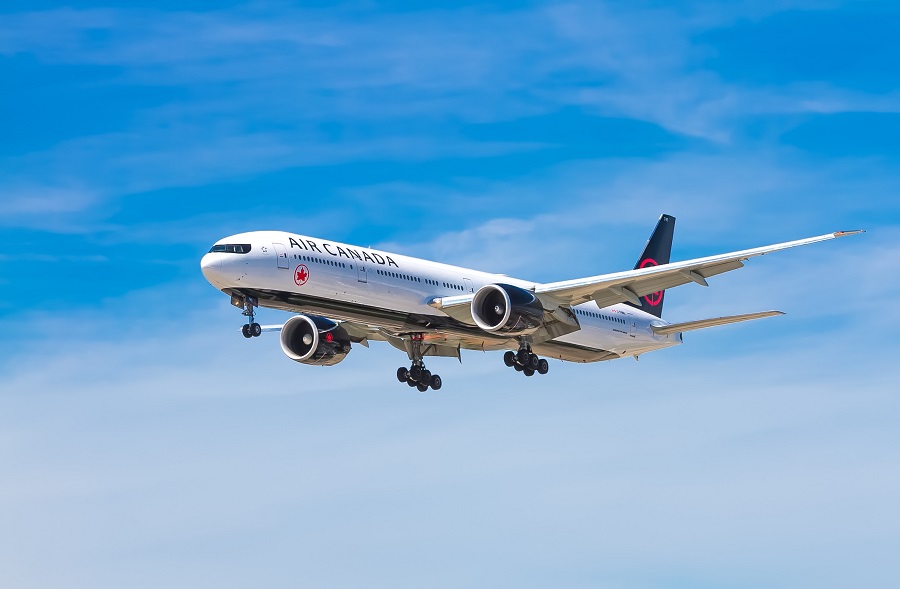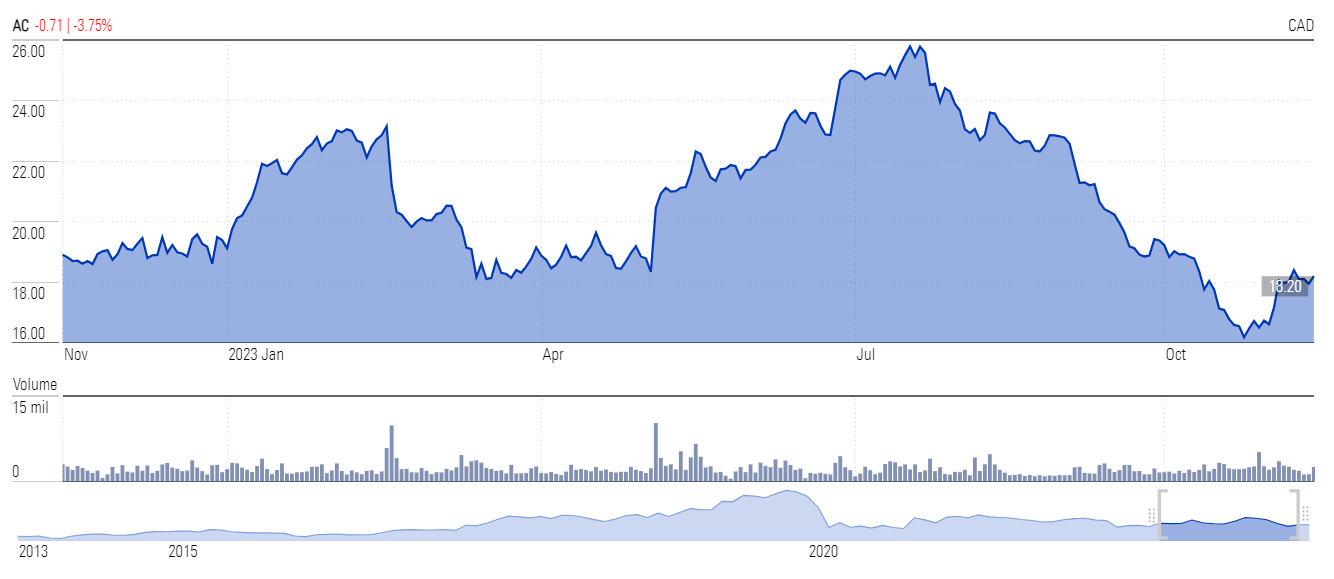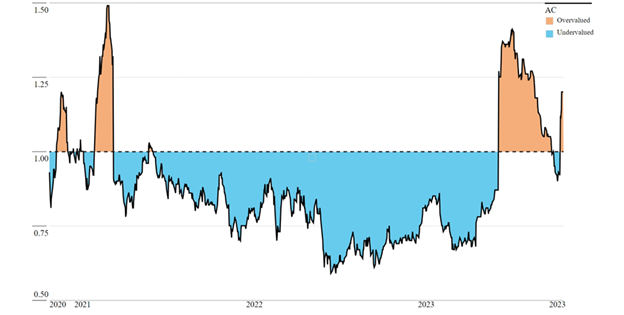
Air Canada AC released its Third Quarter earnings report on Oct. 30, 2023. Here’s Morningstar’s take on what to think of Air Canada’s earnings and stock.
Key Morningstar Metrics for Air Canada
- Fair Value Estimate: $15.00
- Morningstar Rating: 2 stars
- Morningstar Economic Moat Rating: None
- Morningstar Uncertainty Rating: High
What We Thought of Air Canada’s Q3 Earnings
- Air Canada’s third quarter revenue and earnings surpassed expectations, mostly because of a good summer travel season with higher than usual prices and revenues.
- Longer term, the airline industry is not profitable as competition and price sensitivity erodes profits. Air Canada’s costs have grown faster than previously estimated for wages, maintenance, ground crews, catering, and the like.
- We have lowered our fair value estimate for Air Canada stock, which has a ‘High’ uncertainty rating. It would have to trade at a very steep discount for us to contemplate recommending it.
Air Canada Stock Price

Source: Source: Morningstar Direct Data as of Nov. 15, 2023
Fair Value Estimate for Air Canada
With its 2-star rating, we believe Air Canada’s stock is overvalued compared to our long-term fair value estimate.
Airlines faced the worst operating environment in history in 2020 due to the COVID-19 pandemic and dramatically cut capacity to respond to steep drops in demand. We think the worst is over for Air Canada, as border restrictions have been lifted, and we see a domestic leisure-led recovery for airlines and anticipate Air Canada can return to 2019 levels of capacity in 2024, slower than some U.S.-based peers.
Our average forecast operating margin for Air Canada is approximately 7%, 220 basis points below the 2015-19 average. We no longer see evidence that pandemic-related restructuring has generated labor efficiencies at Air Canada, nor do we believe that the airline or its peers will benefit from elevated yields indefinitely.
We’re expecting capital expenditures will be about CAD 2.0 billion in 2023 and average about CAD 1.9 billion per year over our forecast period.
We think an above-average cost of equity and debt are reasonable for this airline, which leads us to a WACC of 8%.
Read more about Air Canada's fair value estimate.
Air Canada Historical Price/Fair Value Ratio
Ratios over 1.00 indicate when the stock is overvalued, while ratios below 1.00 mean the stock is undervalued.

Source: Source: Morningstar Direct. Data as of Nov 7, 2023
Economic Moat Rating
This business is highly price-competitive, capital-intensive, and labor-intensive, making it difficult for an airline to generate any profit beyond its cost of capital. Indeed, industry group IATA estimated in 2018 that return on invested capital had only approached the industry's cost of capital once in the preceding two decades and never exceeded it. Our own modeling reflects the same reality. We conclude that Air Canada does not have an economic moat.
What's more, the industry has been pummeled by three of the most severe global macroeconomic events of the last two decades: the 9/11 terrorist attacks, two global pandemics (SARS and SARS-CoV-2), and the Great Recession of 2007-09. Similar macroeconomic events are likely to recur in the foreseeable future, and investors in airlines would risk permanent capital loss in such situations.
Embedded in the cost of doing business as an airline, and exacerbating the challenge of staffing, is the strong seasonality of travel. Over the last 20 years, North American carriers have collectively faced a 30% January-to-June spike of monthly demand (or a 23% June-to-January slump), measured as aggregate monthly revenue passenger miles. International demand is more volatile and brings extra competition from international carriers.
Airlines provide an invaluable service to their customers and communities, often stimulating the economies of those destinations they connect into the global travel network. However, investors in airlines are flying on a wing and a prayer, as we see no prospect for durable economic profit in this industry. Instead, the duopoly of Airbus and Boeing reap the economic reward from providing successively more efficient, powerful aircraft, which airlines line up to buy or rent so their service and cost profiles can keep up with competing carriers.
Read more about Air Canada’s economic moat rating.
Risk and Uncertainty
Airlines are exposed to geopolitical risks throughout their networks, face commodity price risk from the oil market, risk of irrational competition, ongoing and occasionally severe operational disruption due to weather, and general cyclical risk because demand for air travel is sensitive to overall economic activity. The geopolitical risk is broad, as any number of unpredictable events such as wars, pandemics, international tension, and natural disasters affect travel.
Airlines have a long history of irrational competition due to low industry entry barriers, high industry exit barriers, and price-sensitive customers. We believe airline consolidation after the 2007-09 financial crisis temporarily reduced the potential for irrational competition, as distressed carriers such as Northwest, Continental, US Air, Airtran, ATA, and Virgin America were all absorbed by incumbents. During the ensuing 2015-19 honeymoon, most North American carriers benefited from low tax bills as they used net operating loss carryforwards from previous recessions. However, we expect most of these tax benefits will be used up in the next few years even as most carriers also took on billions of dollars of debt to weather the pandemic.
We see some environmental, social, and governance risk for Air Canada, as for airlines in general, primarily stemming from the greenhouse gas emissions from the company's operations. If carbon taxes or similar carbon reduction incentives were enacted, airlines would likely pass the cost on to the consumer, which we anticipate would reduce marginal travel demand. At this point, ESG risk does not affect our fair value estimate or scenario analysis.
Read more about Air Canada’s Risk and Uncertainty.
 Air Canada Stock Bulls Say
Air Canada Stock Bulls Say
- Borders have reopened, which should allow increase international travel.
- Demand for leisure travel has recovered sharply from the pandemic. Pent-up demand could buoy air travel even during a recession.
- Air Canada has a solid track record of managing its debt load, and we don’t see leverage as am imminent threat to it liquidity.
 Air Canada Stock Bears Say
Air Canada Stock Bears Say
- Air Canada’s business model is predicated on international travel, which has recovered more slowly than domestic travel.
- Ultra low-cost carriers may enter the Canadian market and create fare pressure across the industry.
- As Canadian market share leader, Air Canada has the most to lose if a financially distressed rival were to lower process to compete for passengers.
This article was compiled by Jitu Alemu Dribssa






:quality(80)/cloudfront-us-east-1.images.arcpublishing.com/morningstar/FGC25JIKZ5EATCXF265D56SZTE.jpg)














